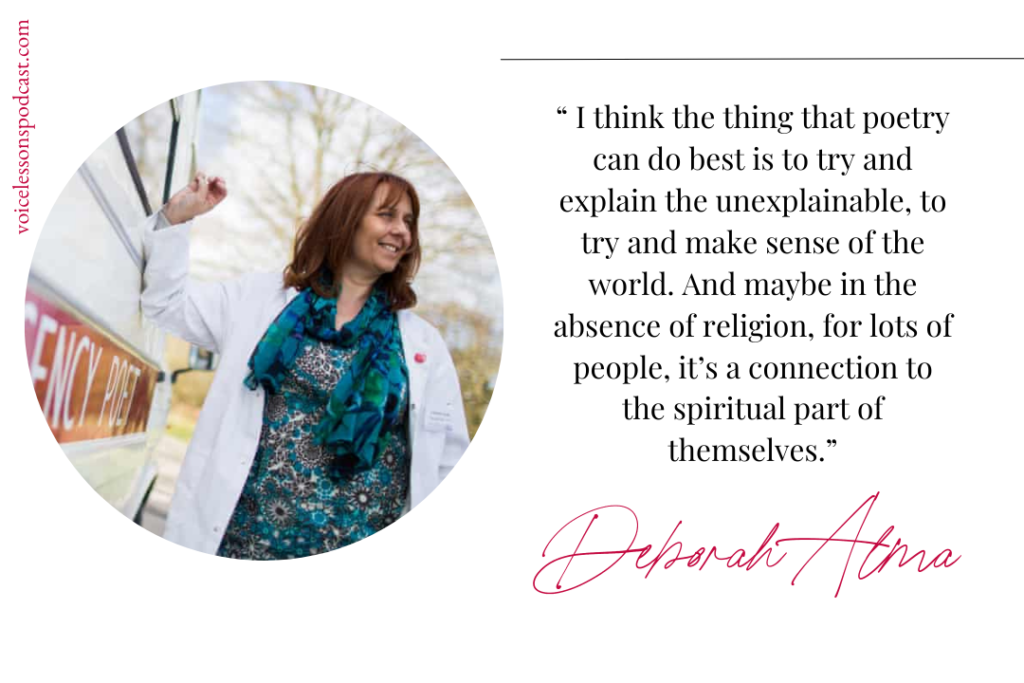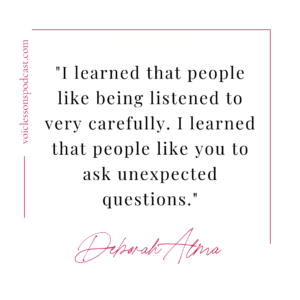https://directory.libsyn.com/episode/index/id/14202863
After a flash of inspiration, Deborah Alma bought a vintage ambulance on eBay and became “The Emergency Poet”. Another flash several years later and she bought a shop, founding the world’s first “Poetry Pharmacy”, a tea, performance, and consultation space where Alma prescribes handpicked poems to her patients. In this episode, we take an inside look at the healing, intimate power that poetry has, and how it connects people to the spiritual part of themselves. You’ll learn that being on the outside of normal can be the best part of how you share your voice and operate your business, allowing some decisions to be made purely on moments of playful creativity.
 Deborah Alma is a UK poet who teaches Creative Writing at Keele University and has worked for years as a writer in the community. As Emergency Poet she administered poetry on prescription from her vintage ambulance. She is editor of Emergency Poet-an anti-stress poetry anthology, #Me Too – rallying against sexual harassment- a women’s poetry anthology ,Ten Poems of Happiness and co-edited with Dr Katie Amiel These Are the Hands-Poems from the Heart of the NHS. Her first full collection Dirty Laundry is published by Nine Arches Press. She is the co-founder, with James Sheard the Poetry Pharmacy.
Deborah Alma is a UK poet who teaches Creative Writing at Keele University and has worked for years as a writer in the community. As Emergency Poet she administered poetry on prescription from her vintage ambulance. She is editor of Emergency Poet-an anti-stress poetry anthology, #Me Too – rallying against sexual harassment- a women’s poetry anthology ,Ten Poems of Happiness and co-edited with Dr Katie Amiel These Are the Hands-Poems from the Heart of the NHS. Her first full collection Dirty Laundry is published by Nine Arches Press. She is the co-founder, with James Sheard the Poetry Pharmacy.LISTEN: APPLE PODCASTS | STITCHER | SPOTIFY
TOPICS DISCUSSED IN THIS EPISODE:
- What is “emergency poetry” and how did Deborah turn her creative passion into a career?
- Why we turn to poetry at times of crisis or at heightened states of emotion.
- How poetry taught Deborah the power of listening.
- The intimate nature of poetry and how it can serve as an extension of yourself, allowing you to become more open.
- How being mixed race/mixed class informed Deborah’s work and the importance of combatting situations of prejudice.
- Why what Deborah values most about herself is invisible to others.
- The journey from creative to businesswoman.
- The struggles of taking yourself seriously as a creative business owner and the boundaries that should be addressed.
- Why some creatives want to give away their work for free.
- Do you have to be ruthless to be good at business?
- The collegiate way that women lead and why they work with you instead of for you.
#LESSONUP:
(1:25) About eight years ago, I suddenly bought a vintage ambulance on eBay. All of my friends saying, no, do it. It wasn’t an idea to have a business particularly. It was just a kind of a piece of art, I suppose. A kind of creative idea to go and do poetry prescriptions.
(7:14) And it’s got all the original ironmongers shelves, sort of mid Victorian shelves. And I was peering through the dusty windows at these shelves and the mahogany counter and an old tale. And it was a bit like the emergency poet thing. I just had this kind of flash of inspiration.
(7:24) The flash of the inspiration, is that the same place where the poems come from for you?
Yes. It’s the kind of free, almost childlike, playful part of me that hasn’t died. I just indulge it all the time. It’s the same place I think.
(9:28) I think what happens here as well as the States is that school can put you off to poetry. People pick poetry apart in the classroom and it destroys it. It destroys that kind of immediate and intimate response.
(12:22) I realized how sharing a poem could take them in their head to somewhere positive. So I learned that, I learned that people like being listened to really carefully. I learned that people like you to ask unexpected questions. They like to talk about themselves.
(12:33) There’s a process…this question and then this question, so that they don’t go off into unsafe territory. It’s always about them. It’s always about positive parts of themselves. Then it kind of comes to a resolution and at that point I asked them what they’d like a poem for whether it’s work stress or anxiety or they’re bullied at work or whatever it is, and it’s right at the end. So we don’t dwell on the thing too much. The poem should answer that.
(15:10) It’s such a personal relationship. That that very intimate relationship, yourself, your emotions in that text, whether it’s fictional or a poem.
(21:34) For me because it’s not seen as well. It’s part of me that’s really important and that I love and I’m not in touch with it. It’s not addressed most of the time. So it was really nice to be able to write about it actually. There’s a line in one of the poems from when I was little and we put bells around our ankles, my mum and me and my sister and we’d dance, Indian dancing and I grew up with the films and it goes right through me. But it’s not seen.
(18:19) I think there’s something that women do that’s very different. It’s more about working together, worrying about the people, how people feel when they work with you, that they work with you and not for you. That kind of collegiate way of doing things. I can be a bit of a softie. I want to give things away all the time.
RESOURCES:
Dirty Laundry, Deborah Alma
The Emergency Poet, Deborah Alma
#MeToo, Deborah Alma
PIN IT:


Comments +